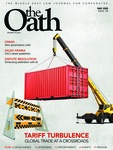PwC Middle East launches region’s first Legal GenAI offering

As part of its ongoing investment in technology, PwC Legal Middle East has introduced a new Legal Generative AI offering to accelerate the transformative role of GenAI in the legal industry. This first-of-its-kind offering in the Middle East strengthens PwC’s NewLaw practice that helps organisations improve their legal workflows and processes through innovative technological and resourcing solutions.
Leveraging PwC’s global alliances with OpenAI, Harvey and Contract PodAi (LeAh), PwC Legal Middle East will provide private sector and government organisations a variety of services from concept to implementation, including the identification and prioritisation of legal GenAI use cases, selection and procurement of available technology, custom build or configuration implementation support, and importantly change management support.
Findings from PwC Middle East’s recent annual CEO survey highlights that almost three-quarters of Middle East CEOs expect GenAI to significantly change how their companies create, deliver, and capture value over the next three years, while almost half say they changed their tech strategy last year because of GenAI, ahead of the 31 per cent global average. PwC expects companies in the region to benefit from early adoption of GenAI, with the technology offering greater efficiency and accuracy for legal functions.
PwC Legal Middle East is also augmenting its existing legal advisory, governance, and compliance services using AI and GenAI in an effort to deliver these and new services more efficiently and at a lower cost to the client.
PwC Legal GenAI’s offering will be led by Alex Rosenrauch, the newly appointed Legal AI and NewLaw leader at PwC Middle East. Rosenrauch comes with extensive experience in building, implementing, and procuring Legal Tech solutions for clients across Asia Pacific (APAC) and the US, and he led the Legal AI and GenAI delivery capability for PwC across the APAC region before moving to the Middle East.
Commenting on the announcement, Rosenrauch said, “In an era where nearly three-quarters of CEOs in the Middle East anticipate GenAI to significantly change the way their company creates, delivers, and captures value, there’s no doubt that legal needs to keep up. Our first-of-its-kind offering is not just a testament to our commitment to legal innovation, but also a reflection of our deep investment in the region’s legal tech landscape. By expanding our NewLaw capability, doubling down on our legal tech capabilities, and forging strategic partnerships with industry leading solutions including OpenAI, Harvey, and LeAh, we are setting a new standard for legal innovation in the Middle East.”
Sandeep Agrawal, global legal technology and alliances leader at PwC, added, “Our new legal technology offering in the Middle East is designed to meet the unique needs of the region t. Our global Legal leadership is investing significantly in the Middle East to make sure our clients in the region gain access to the latest GenAI models of PwC as well as our key alliance partners. We are also investing in custom GenAI Arabic models taking into account the intricate nuances of regional requirements to ensure that the legal tech is perfectly tailored for both present and future applications.”
Amir Kordvani, head of legal for PwC Middle East, added, “We understand that our clients are increasingly prioritising GenAI in their operations. Recognising this shift, we are committed to investing in legal Gen AI solutions to enhance our service offerings. We are dedicated to empowering businesses to harness the transformative potential of Legal GenAI. This is more than an advancement in technology; it’s a leap forward in how legal services are envisioned and delivered in the Middle East.”
The new offering will be showcased at PwC’s inaugural Middle East LegalTech Evolution Summit on October 15th in Dubai, as well as during PwC’s ongoing Tax and Legal Seminar Series.
PwC’s expertise and long-term experience in the region will help ensure that the technology is fit for purpose now and in the future. The technology will be available to both corporate legal departments and business teams to drive next generation innovation.

























































































































